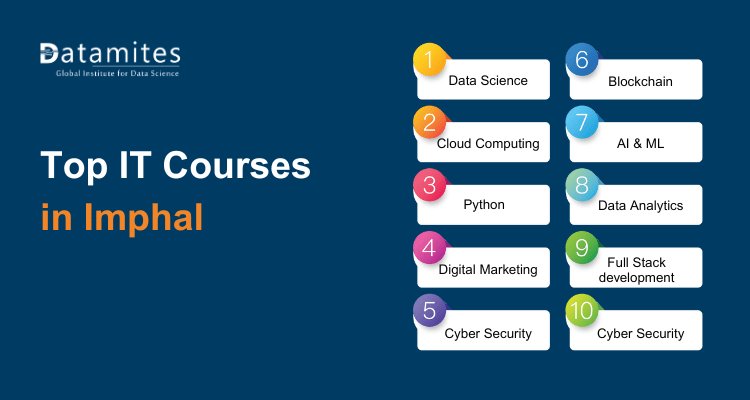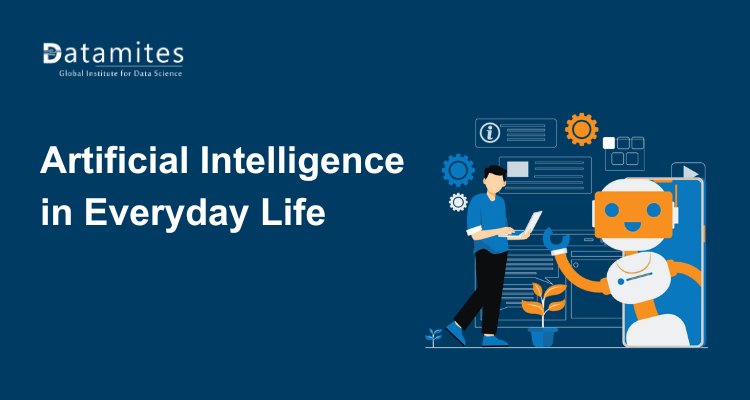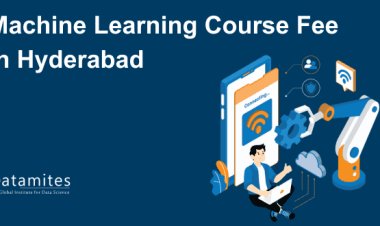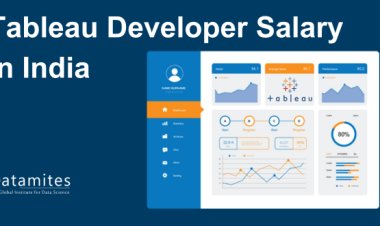Is Data Science Getting Saturated? Here's the Truth
As data science grows in popularity, concerns about job market saturation are rising. This blog explores whether the field is truly overcrowded or if strong demand still exists, highlighting current trends and the future outlook for aspiring data scientists.

As more professionals flock to the field, there’s growing speculation about the future of data science. With an increasing number of people entering the field, many are asking: Is data science becoming oversaturated? In this post, we’ll take a closer look at the current landscape of data science, exploring whether the demand is still strong or if the field is nearing its peak. Let’s separate fact from fiction and uncover the truth behind the concerns about market saturation. This blog takes a deep dive into the state of data science and explores whether the concerns around saturation hold any real weight.
Understanding the Data Science Boom
Over the past decade, data science has transformed from a niche specialty into one of the most in-demand fields in tech. With the explosion of data and rapid advancements in AI and machine learning, businesses across every industry—from healthcare to finance—have embraced data-driven strategies to optimize operations and drive growth. This demand led to a surge in roles like Data Scientist, Machine Learning Engineer, and Data Analyst, all offering lucrative salaries and career growth.
Media hype and success stories further fueled interest, branding data science as "the sexiest job of the 21st century." At the same time, accessible learning resources such as online courses, bootcamps, and open-source tools opened the doors for a massive influx of aspiring data professionals. As the talent pool expanded, so did concerns about whether the market could absorb it—sparking questions around potential saturation.
However, the numbers suggest otherwise. According to the U.S. Bureau of Labor Statistics, data science jobs are expected to grow by 35% from 2022 to 2032, well above the average for most careers. Additionally, a Markets and Markets report forecasts that the global data science platform market will grow from $95.3 billion in 2021 to $322.9 billion by 2026, with a CAGR of 27.7%. This points not to decline, but to a dynamic and expanding field still full of opportunity.
What Does "Saturation" Mean in the Data Science Job Market?
In the context of the data science job market, "saturation" refers to a situation where the supply of data science professionals meets or exceeds the demand from employers. This can occur when a large number of individuals enter the field, such as through online courses, boot camps, or academic programs, leading to a high volume of candidates. While there might be many people applying for data science roles, it doesn’t always translate into more opportunities, especially if these candidates lack the specialized skills or hands-on experience that companies need.
Saturation doesn't mean declining demand for data science talent; it indicates companies are becoming more selective, seeking candidates with specific expertise, advanced skills, and real-world experience. While many applicants exist, those with higher-level capabilities and domain knowledge remain in high demand. Saturation highlights the mismatch between the quantity of job seekers and the quality of data science skills required.
Refer these articles:
- What Recruiters Look for in Data Science Resumes
- The Rise of Freelance Data Scientists: A Lucrative Career Option?
- Top Data Science Trends to Watch in 2025
Is the Data Science Hype Over? A Deep Dive into Market Saturation
The hype around data science may be settling, but that doesn’t mean the field is saturated. Rather than a decline, what we’re seeing is a strategic shift in the market. The industry is evolving—from explosive growth and high expectations to a more mature, skills-driven phase.
Key Indicators of the Market Shift:
- Rise in Entry-Level Competition: There has been a noticeable surge in applicants for junior data science roles, many of whom have foundational knowledge but limited practical experience. This has led to increased competition at the starting point of the career ladder.
- Shifting Employer Expectations: Companies are moving beyond generalist profiles and now seek professionals with deeper specialization in areas like machine learning, deep learning, and cloud-based analytics. The bar for technical expertise continues to rise.
- Emphasis on Practical Experience: Organizations are prioritizing candidates who can demonstrate real-world problem-solving abilities. Experience with deploying models, working on live projects, and interpreting business impact is becoming a key differentiator.
- Continued Market Growth: Despite the competitive entry landscape, the global data science market was valued at $64.14 billion in 2021 and is expected to reach $378.7 billion by 2030, growing at a CAGR of 22.9%, according to Precedence Research. This underscores the sustained and growing demand for data science capabilities across industries.
In essence, while the entry point may appear crowded, the demand for skilled and experienced professionals continues to rise. The data science field isn’t fading—it’s simply becoming more sophisticated and selective.
Refer these articles:
Data Science Demand vs. Talent Gap: What’s Really Going On?
At first glance, it might seem like the data science job market is oversaturated with talent, but the reality is more complex. While more professionals are enrolling in data science courses than ever before, many companies still struggle to find candidates who meet their qualifications. This suggests that the issue isn’t the quantity of applicants but rather the quality of the skills they possess.
The demand for data science professionals remains robust across various sectors, including healthcare, fintech, logistics, e-commerce, and agriculture. According to the World Economic Forum’s Future of Jobs Report 2023, roles in data science and AI are among the fastest-growing, with data analysts and scientists expected to see a 30–35% increase in demand over the next five years. Companies are actively searching for professionals who can analyze data, build predictive models, and apply machine learning techniques to enhance decision-making. As the applications of data science continue to expand, the need for well-trained, industry-ready professionals only becomes more pressing.
This ongoing demand is evident across job boards and hiring reports globally, where roles like Data Scientist, Data Engineer, Machine Learning Engineer, and BI Analyst remain among the most sought-after tech careers.
So Where’s the Gap?
The issue is not a shortage of applicants but a misalignment between industry expectations and the skillsets that many candidates bring to the table. While many people complete data science programs, not all of them have the hands-on experience or advanced skills that employers are looking for.
Common skill gaps include:
- Lack of practical experience with real-world datasets
- Insufficient understanding of solving business problems
- Weak coding abilities in key data science languages like Python, R, and SQL
- Poor communication or data storytelling skills
The demand for data science professionals is strong and shows no sign of diminishing, but the talent gap remains a challenge for many businesses. Companies will need to be strategic in how they attract, retain, and develop talent, while also embracing new technologies and approaches to data science. For job seekers, the future of data science remains promising, with many opportunities for those who are willing to upskill and meet the evolving needs of the industry.
The Evolution of Data Science Roles in 2025 and Beyond
The field of data science is evolving at a rapid pace, and so are the roles within it. By 2025 and beyond, the broad "Data Scientist" title is being replaced with more specialized positions that are tailored to meet the specific needs of various industries. Some of the emerging roles include:
- Machine Learning Engineers: Focused on developing scalable machine learning systems.
- Data Engineers: Responsible for managing data pipelines and infrastructure.
- AI Specialists: Concentrating on intelligent automation and decision-making systems.
- Business Intelligence Analysts: Connecting data with strategic business insights.
- MLOps Engineers: Ensuring the reliable performance of models in production environments.
These new roles demand deeper expertise, meaning a generic data science course may no longer suffice. To succeed, learners need to pursue specialized training that aligns with their career aspirations.
Top data science training institutes are adapting to these changes by offering niche tracks such as natural language processing (NLP), computer vision, and data engineering. When selecting a program, it’s essential to choose one that provides practical, hands-on experience and placement support to ensure you're well-prepared for these advanced roles.
Furthermore, companies now seek more than just technical skills. Domain knowledge, critical thinking, and the ability to effectively communicate data insights are increasingly valuable. Whether you opt for an online bootcamp or a traditional course, ensure that the program is in line with the latest industry trends. This will set you up for a growing career in data science in the years ahead.
Refer these articles:
How to Future-Proof Your Data Science Career
To stand out in a seemingly crowded space, professionals must:
- Prioritize Comprehensive Curriculum: Choose a program with a well-rounded curriculum, experienced instructors, and hands-on projects to build your skills.
- Networking and Collaboration: Consider courses that encourage peer collaboration, as it can help you build valuable professional networks.
- Placement Support: Look for programs that provide placement assistance, offering a direct pathway into the job market.
- Master Essential Tools: Gain proficiency in key data science tools like Python, R, Spark, Power BI, and cloud platforms such as AWS or Azure.
- Gain Practical Experience: Work on real-world case studies, engage in Kaggle competitions, or pursue internships to gain hands-on experience.
- Stay Updated on Trends: Keep up with the latest developments in data science by following blogs, attending webinars, and learning about topics like explainable AI, MLOps, and edge analytics.
- Choose a Reputable Institute: Select a training provider with a strong reputation, experienced faculty, and industry ties to ensure quality education and support.
So, is data science getting saturated? The short answer is no—but the game has changed. The era of easy entry is over, and today’s data science career path demands dedication, skill, and continuous learning. The demand for data science is not declining; it's maturing.
If you're looking to kickstart your career in data science, exploring top-rated data science training in Chennai, Pune, Hyderabad, Bangalore, Ahmedabad, Coimbatore, Mumbai, Kolkata, and Delhi, along with flexible online programs, is a great way to get started. Opting for a well-structured data science course, with hands-on learning, expert mentorship, and placement support, can provide you with a competitive edge in this rapidly expanding field.
When choosing a data science training institute, consider industry-leading institutions like DataMites. Recognized by Analytics India Magazine (AIM) as one of the Top 20 AI Institutes in India, alongside prestigious institutes like IIT and IIM, DataMites emphasizes practical, industry-relevant learning. The curriculum is designed to equip students with the latest knowledge in data science, machine learning, AI, and data analytics.
At DataMites Training Institute, you’ll gain access to globally recognized certifications, such as Certified Data Scientist programs and Python Development courses, accredited by organizations like IABAC and NASSCOM FutureSkills. The institute also offers placement assistance and internships, ensuring you acquire real-world experience essential for building a successful career in data science.
For those who prefer offline courses, DataMites provides data science offline courses in Bangalore, Hyderabad, Chennai, Pune, Ahmedabad, Coimbatore, and Mumbai, while also offering flexible online options for learners worldwide. Whether you're just beginning to explore the scope of data science or a working professional aiming to upskill, DataMites offers career-focused training aligned with industry demands.
When choosing a data science course in Bangalore, it’s essential to prioritize quality, specialization, and hands-on experience over flashy marketing or cheap course fees. A sound education from a reputable data science institute in Chennai will help you stay ahead in the competitive job market.
As we look toward 2025 and beyond, the future of data science remains incredibly promising. To secure a rewarding data science career, it’s important to stay adaptable, specialize in high-demand areas, and continually update your skills. By investing in the right education and training now, you’ll be well-positioned to boom in this evolving field.





